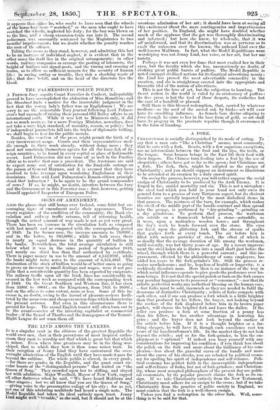A FORK.
CHRISTENDOM is socially distinguished by its mode of eating. To say that a man eats "like a Christian " means, most commonly, that he eats with a fork. Beasts, with a few sagacious exceptions, use no intermediate between the food and the lips, the teeth, or the tongue. Some human beings in the East lift their food with their fingers. The Chinese turn feeding into a feat by the use of chopsticks ; others have got so far as the spoon; but Christians use a fork. The fork, then, might be adopted as the ensign of Christianity ; and you should suppose an instrument so illustrious to be attended at its creation by a duly sacred spirit.
On seeing the process, however, you will rather suppose the social ensign of Christianity to be produced by the Arch Enemy. It is forged in fire, amidst mortality and sin. This is not a metaphor : the steel tool which you hold in your hand not only owes its general form to a process of very Tartarean aspect, but its choicest beauties are specially imparted by the most diabolical items in that process. The neatness of the turn, for example, which makes the swell of the middle part of the handle contract and then spread into the prongs, is performed by "dry-grinding "—grinding on a- dry grindstone. To perform that process, the workman sits astride on a framework behind a stone—astraddle, as it were, upon a motionless wooden horse ; and throughout the day's work he bends forward over the stone. His eyes are fixed upon the glittering fork and the stream of sparks that gushes forth at every touch. The air before him is filled with minute particles of steel, the effect of which is so deadly that the average duration of life among the workmen, until recently, was but thirty years of age. By a recent improve- ment the steel-laden air is drawn into a small shaft just before_the wheel, through which there is a powerful current ; and this im- provement, effected by the philanthropy of some employers, has added ten years to the fork-grinder's life. Still the process re- mains unwholesome ; and he, hopeless of health or longevity, is a recklessly dissolute man. Here then is an instance of the way in which social influences operate to give goods the preference over hu- man beings. It is not that the special polish or turn on the fork causes any peculiar happiness to its possessor or " consumer,"—nor that its artistic perfection works any msthetical blessing on the human race, —but forks must be sold, inasmuch as they arc needed to fulfil the decorums of distinctive Christianity ; sellers of forks compete with each other, and if one can produce a fork which is a little brighter than that produced by his fellow, the buyer, not looking beyond the surface of the fork displayed before him in its brown paper packet, will choose the brighter fork and leave the duller. If the seller can produce a fork at some fraction of a penny less than his fellow, he has another advantage in lowering his price ; and the buyer does not look beyond the surface of the article before him. If it is a thought brighter or a far- thing cheaper, he will have it, though each excellence cost ten years of the handicraftsman's life. In the market they do not look beyond the article ; and as for the fork-grinder, to him the em- ployment is " optional." If indeed you busy yourself with any considerations for improving his condition ; if you think less about the polish on the fork and more about the brilliancy of his com- plexion—less about the graceful curve of the handle and more about the curve of his cheeks, you are rebuked by political econo- my for spoiling his spirit of independence and self-reliance. Poli- tical economy has perfect faith in the incorruptible independence and self-reliance of forks, but not of fork-grinders; and Mristian-
, whose most accepted philosophers of the present day are politi-
cal by its popular proverb claims the fork as its en- sign. If we take Christianity entirely from the New Testament, Christianity must adhere for an ensign to the cross; but if we take Christianity from the practice of polite society in England, we must confess that the fork is a well-chosen ensign.
Unless you find' a redemption in the silver fork. Well, some- thing is to be said for that.


























 Previous page
Previous page